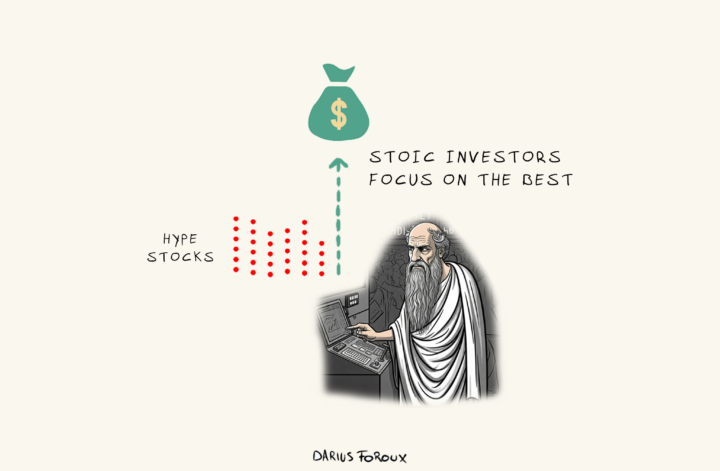The Ancient Greek philosophy of Stoicism has been around for more than 2300 years but is now more relevant than ever for investors. Those who want to build wealth in the stock market do well when they invest like a Stoic.
The core idea of Stoicism is simple: Focus on what you control and ignore everything else. But as investors, we tend to focus on the latter, which harms our future returns.
If you always focus on the factors you don’t control, like the state of the economy, inflation, or what the Fed does next, you will lose money. No one can predict macro factors or what the stock market does in the short term.
As investors, we should focus on what we control, and that’s a very limited area. Essentially, we only control our own decisions about what to invest in.
So, what would a Stoic invest in? Quality. As Seneca, one of the most famous Stoic philosophers, once said:
“It is quality rather than quantity that matters.”
Seneca, a very wealthy person in his own time, stressed that a life well-lived, even if short, is far superior to a long life spent poorly. This wisdom can be directly applied to investing.
Instead of spreading our investments thin across numerous mediocre opportunities, a Stoic investor would focus on fewer, high-quality investments. This means thoroughly researching and selecting companies with strong fundamentals, ethical practices, and sustainable growth potential.
This is also in line with Warren Buffett’s strategy. Buffett, who has demonstrated Stoic tendencies throughout his lifetime, illustrated this with an analogy involving LeBron James, one of the greatest basketball players of all time. He said:
“If you have LeBron James on your team, don’t take him out of the game just to make room for someone else. … It’s crazy to put money into your 20th choice rather than your first choice.”
This means that if you have a good investment strategy, stick with it rather than diversifying just for the sake of diversification.
How to construct a Stoic stock portfolio
Investing in an S&P 500 index fund should always follow the basis of every Stoic investor. After all, the index as a whole is the LeBron James option of investing.
A Stoic investor keeps an emergency fund of 6 months’ worth of expenses in their savings account. But other than that, a Stoic will invest 100% of their capital in an S&P 500 ETF to keep investing simple.
A Stoic invests in the best and ignores the rest.
The S&P 500 has historically outperformed other asset classes over the long term. Here’s a comparison of the average annual returns for different asset classes over the past several decades:
| Asset Class | Average Annual Return (Last 30 Years) |
|---|---|
| S&P 500 Index | 10.52% |
| Real Estate (REITs) | 9% |
| Bonds (U.S. Treasury) | 5-6% |
| Gold | 3-4% |
| Cash (Savings Accounts) | 0.5-2% |
The outperformance of the S&P 500 makes it a solid foundation for every person’s portfolio. As a Stoic investor, simply invest a set amount of money in the S&P 500 every month. When you make investing a habit, you take your emotions out of the game.
If you have an appetite for picking stocks, you could invest in quality stocks with what I call the 90/10 rule. That means you invest 90% in the S&P 500 and 10% in a handful of individual stocks. This ratio can also be 85/15 or 80/20 if you’re a more seasoned investor, but I would never push it beyond 80/20. Otherwise, you risk becoming a stock picker.
For example, my current portfolio looks like this:
- 85% in S&P 500 (VOO)
- 8% in Adyen (ADYEN.AS)
- 7% in Tesla (TSLA)
I started buying Tesla stock in April 2024 because I wanted to have additional exposure to the stock. My view was that it was undervalued. I averaged into the position at $163. I talk about why I started investing in $TSLA in this video:
While my other picks are not part of the S&P 500, Tesla is, but has underperformed the market for the past two years.
I’m bullish on Tesla because it is not only the best EV maker in the world but also one of the largest AI companies. If that’s not enough, it is also building the most practical robot, Optimus, and wants to take on Uber with its self-driving taxis.
Adyen has one of the simplest and most solid business models in tech: Payment processing for large corporations. Their product is safe, margins are great, and their customer base has a huge hurdle to switch to competitors.
As a Stoic investor, your goal is to set yourself up to win financially and in life. You can accomplish that in the best way possible by dedicating the majority of your portfolio to the best-performing asset class. The rest is outside of your control.
How to pick quality stocks like a Stoic
Investing like a Stoic means being a contrarian. While most people pursued pleasure and fun, the Stoics focused on improving themselves. As Epictetus once said, you will always receive criticism when you choose to do hard things:
“If you want to improve, be content to be thought foolish and stupid.”
This is also true in the market. If you want to beat the market, you have to go against the herd. When everyone is selling a great stock, and you decide to buy it, you must be okay with looking foolish as long as it keeps going down.
As a Stoic investor who’s trying to find quality companies, you value traditional measures like strong balance sheets, high-profit margins, and moats. But there’s one other factor that I value highly as a Stoic, which is institutional ownership.
If a company’s stock has less than 50% institutional ownership (including strategic entities), I always pass. It means there are too many individual investors involved.
As a Stoic, you should always be cautious of stocks and assets that are primarily driven by retail investors. While institutional investors are not perfect, they often have a long-term strategy. They invest in large and proven companies.
That’s where you also want to be as a Stoic investor—not in the unproven and small companies. Sure, those smaller companies have the largest potential for going to the moon, but they also have the largest potential of going to zero.
By looking at institutional ownership, you instantly filter out a large portion of stocks. From that point, it’s a matter of considering industries and companies that you are passionate about and also know a great deal about.
As you go about investing, always remember what Marcus Aurelius said:
“You have power over your mind – not outside events.”
When you understand this, you will find greater investing success.




